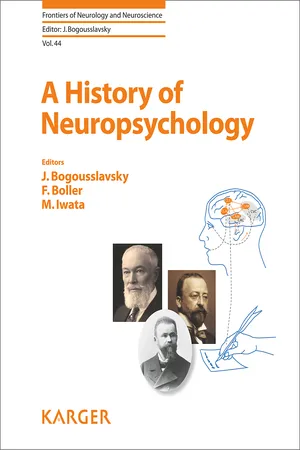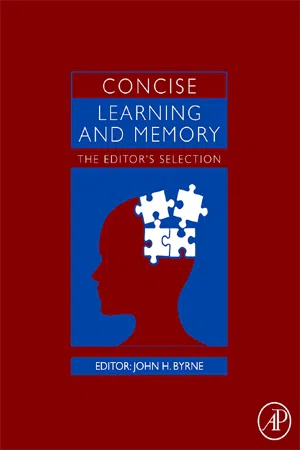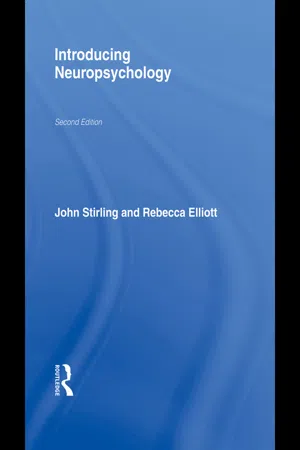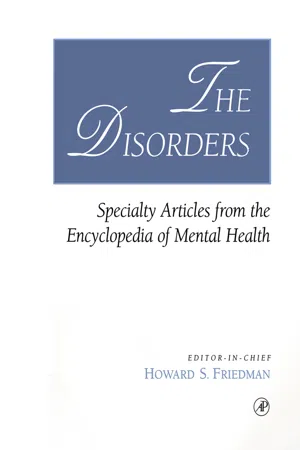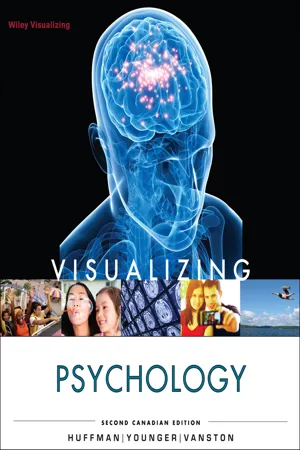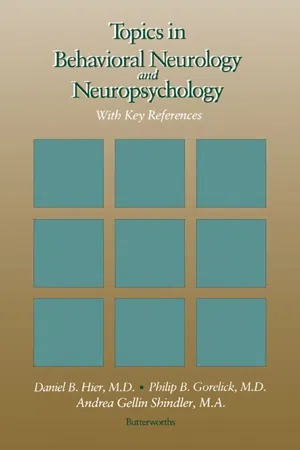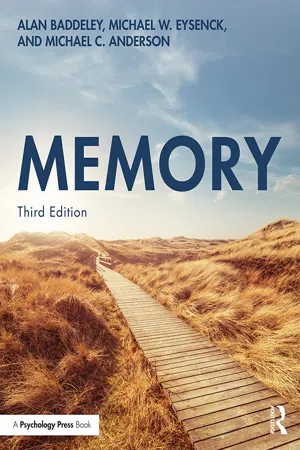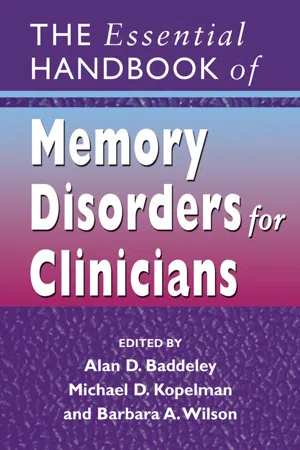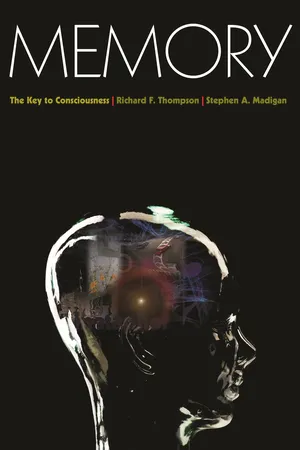Psychology
Amnesia
Amnesia is a condition characterized by partial or total loss of memory. It can be caused by various factors such as brain injury, trauma, or psychological disorders. Amnesia can affect both short-term and long-term memory, leading to difficulties in recalling past events or forming new memories.
Written by Perlego with AI-assistance
10 Key excerpts on "Amnesia"
- eBook - PDF
- Julien Bogousslavsky, François Boller, Makoto Iwata, Julien, Bogousslavsky, François, Boller, Makoto, Iwata, Julien Bogousslavsky(Authors)
- 2019(Publication Date)
- S. Karger(Publisher)
On the other hand, it was recognized that psychological factors might affect development of Amnesia, and sources of intense emotional reaction could be identi-fied with its origins and progression or resolution. Early writings on Amnesia had identified potential psychological factors. Psycho-logical imbalances were considered amenable to distraction, passage of time, and res-toration of vitality [25]. Later, psychological methods, including hypnosis or psycho-therapy, were used in treatment. The psychological or secondary benefit of Amnesia and forgetting is thought to be linked to the quality of contents of recollection, or lack thereof. Concurring with prior philosophical and psychological perspectives, it was poignantly noted [25] that loss of memory may sometimes be a blessing, as after psy-chological trauma, and recollection of more pleasant times or experience may be the basis of wisdom or serenity. By early in the 20th century, commonly recognized characteristics of Amnesia retained from earlier classifications were attributes of complete or partial, stable and continuous or temporary, and anterograde or retrograde forms [36], in addition to nosology used by Sauvages and followers. Precise delineation categorized Amnesia based on pathogenesis (i.e., dynamic or organic), duration (transient or persistent), degree (partial or general), onset and natural course (i.e., sudden, progressive, or periodic, intermittent), and chro-nology (i.e., retrograde, anterograde, or retro-anterograde) [37]. Lastly, Amnesia was understood to be due to disruption in any of 3 memory processes: reception or registration, conservation, and reproduction of the mental impressions [36, 37]. It has remained, apparently throughout history, important to understand and distin-guish causes of memory loss to more properly approach, respond to, or treat cases. Bogousslavsky J, Boller F, Iwata M (eds): A History of Neuropsychology. - eBook - PDF
Concise Learning and Memory
The Editor's Selection
- (Author)
- 2010(Publication Date)
- Academic Press(Publisher)
The brain is organized such that declarative mem-ory is a distinct and separate cognitive function, which can be studied in isolation from perception and other intellectual abilities. Significant informa-tion about how memory is organized has come from the study of patients with memory disorders (amne-sia) and from animal models of Amnesia. Amnesia (neurological Amnesia and functional Amnesia) refers to difficulty in learning new information or in remembering the past. Neurological Amnesia is characterized by a loss of declarative memory. It occurs following brain injury or disease that damages the medial temporal lobe or diencephalon. Neurological Amnesia causes severe difficulty in learning new facts and events (antero-grade Amnesia). Patients with neurological Amnesia also typically have some difficulty remembering facts and events that were acquired before the onset of Amnesia (retrograde Amnesia). Functional Amnesia is rarer than neurological Amnesia and can occur as the result of an emotional trauma. It presents as a different pattern of antero-grade and retrograde memory impairment than neurological Amnesia. Functional Amnesia is charac-terized by a profound retrograde Amnesia with little or no anterograde Amnesia. In some cases, patients fully recover. Functional Amnesia is a psychiatric 15 disorder, and no particular brain structure or region is known to be damaged. 2.2 Etiology of Neurological Amnesia Neurological Amnesia results from a number of conditions including Alzheimer’s disease or other dementing illnesses, temporal lobe surgery, chronic alcohol abuse, encephalitis, head injury, anoxia, ische-mia, infarction, and the rupture and repair of an anterior communicating artery aneurism. The com-mon factor in all of these conditions is the disruption of normal function in one of two areas of the brain – the medial aspects of the temporal lobe, and the dien-cephalic midline. - eBook - ePub
Introducing Neuropsychology
2nd Edition
- John Stirling, Rebecca Elliott(Authors)
- 2010(Publication Date)
- Psychology Press(Publisher)
Anterograde Amnesia is loss of memory following some trauma. Retrograde Amnesia is loss of memory for a period of time prior to trauma. FIG. 7.3 A schematic diagram that illustrates the distinction between anterograde and retrograde Amnesia. Anterograde Amnesia refers to memory loss following the event that brought about the brain damage. Retrograde Amnesia refers to memory loss of information that precedes the event that brought about the brain damage. classes or subtypes of global memory impairments referred to as anterograde and retrograde Amnesia (see Figure 7.3). Anterograde Amnesia is essentially a memory deficit for the acquisition of new information or new learning since the time of the brain damage. Thus those with anterograde Amnesia will have problems remembering what they did the previous day or even a few moments ago. It can be considered a deficit in the ability to update memory, and in many respects those with this form of Amnesia effectively live in the past as no (or very few) new memories are laid down. This type of Amnesia is typically associated with damage to the medial temporal lobe (MTL) and associated structures, namely the hippocampus, the dentate gyrus, the entorhinal cortex, the perirhinal cortex, and the parahippocampal cortex (Zola-Morgan & Squire, 1993) (see Box 7.2 and Figure 7.4). Some of these structures are connected to other neural regions important for memory such as the thalamus, mamillary bodies, and prefrontal cortex. Retrograde Amnesia refers to an impairment in remembering information from the time prior to the onset of the damage. In terms of neuropsychological research, these two types of Amnesia are often investigated separately, with theoretical emphasis and empirical studies designed to assess or characterise the nature of one or the other form - eBook - PDF
- Richard J. McNally(Author)
- 2005(Publication Date)
- Belknap Press(Publisher)
REMEMBERING TRAUMA TRAUMATIC Amnesia 7 T R A U M A T I C A M N E S I A B ecause the most contested issue in the ªeld of trauma concerns whether people can experience Amnesia for their traumatic experiences, it is essential to clarify what Amnesia really means. Amnesia is an inability to remember certain facts and experiences that can-not be attributed to ordinary forgetting. Merely not thinking about some-thing for a period of time is not the same as Amnesia. A diagnosis of Amnesia requires an inability to remember. Amnesia is usually triggered by a precipitating event. An inability to re-member facts and events that occurred before the precipitating event is called retrograde Amnesia. For example, a person who has received a head in-jury in an automobile accident and who cannot remember anything from the period immediately preceding the crash is suffering from retrograde Amnesia. An inability to remember facts and events that occurred after the precipitat-ing event is called anterograde Amnesia. After his neurosurgical operation for intractable epilepsy, H.M. could not encode any new memories (see Chap-ter 2). He suffered from anterograde Amnesia. Organic Amnesia is caused by events, such as a blow to the head, that produce memory loss by damaging the brain. Psychogenic Amnesia is caused by events whose psychological or emotional meaning produces memory loss without damaging the brain. Or-ganic Amnesia is relatively common; psychogenic Amnesia is extremely rare despite its frequent portrayal in ªlms and novels (for reviews see Kihlstrom and Schacter 2000; Kopelman 1987, 1995). Disentangling organic and psychogenic causes of Amnesia can be difªcult, especially when physical or psychic precipitants seem relatively minor. Sometimes psychological stressors trigger retrograde Amnesia in a person with preexisting neurological impairment, thereby blurring the distinction be-tween psychic and organic causation. - eBook - PDF
The Disorders
Specialty Articles from the Encyclopedia of Mental Health
- Howard S. Friedman(Author)
- 2001(Publication Date)
- Academic Press(Publisher)
Infantile Amnesia commonly covers the period before language and speech develop. Posthypnotic Amnesia A retrograde Amnesia in- duced by means of hypnotic suggestion; it may be can- celed by a prearranged reversibility cue. Transient Global Amnesia A benign and tempo- rary Amnesia characterized by sudden onset, appar- ently caused by momentary vascular insufficiencies af- fecting brain tissue. Traumatic Retrograde Amnesia A retrograde am- nesia resulting from a concussive blow to the head; most of the affected memories are eventually recov- ered, except for a final RA affecting the accident itself. Amnesia may be defined as a special case of for- getting, in which the loss of memory is greater than would be expected under ordinary circumstances. A head-injured patient is no longer able to learn things that he was once able to master easily; a patient with psychogenic fugue loses her identity as well as her fund of autobiographical memories. Amnesia includes frank pathologies encountered in neurological and psychiatric clinics, such as Korsakoff's syndrome, Alz- heimer's disease, traumatic retrograde Amnesia, and multiple personality disorder. But it also includes ab- normalities of memory observed ubiquitously, such as infantile and childhood Amnesia, the exaggerated forgetfulness associated with healthy aging, and the memory failures associated with sleep and general anesthesia. These naturally occurring pathologies of Copyright 9 1998 by Academic Press. All rights of reproduction in any form reserved. 46 Amnesia memory have their counterparts in amnestic states induced in otherwise normal, intact individuals by means of experimental techniques, such as electrocon- vulsive shock in laboratory rats and posthypnotic am- nesia in college sophomores. Experimental research on memory began with the publication of Ebbinghaus' Uber das Gedachtniss in 1885, but the clinical description of Amnesia dates from even earlier. - eBook - PDF
- Karen R. Huffman, Alastair Younger, Claire Vanston(Authors)
- 2013(Publication Date)
- Wiley(Publisher)
What effect do you think damage to the thalamus might have on a person’s day-to-day functioning? Think Critically THE PLANNER ✓ ✓ the injury occurs during this time, the recent memories can be erased (Gaskin et al., 2009). In most cases retro- grade Amnesia is temporary and patients slowly recover over time (Parsons & Otto, 2010). Anterograde Amnesia is most com- monly caused by surgical damage, or dis- ease. Unfortunately, anterograde Amnesia is usually permanent, but patients often show surprising abilities to learn and re- member implicit/nondeclarative tasks (such as procedural motor skills). This type of memory was somewhat preserved for Henry Molaison. Like traumatic brain injuries, disease can damage the physiology of the brain and nervous system and thereby affect memory processes. For ex- ample, Alzheimer’s disease (AD) is a degenerative brain disease character- ized by progressive mental deteriora- tion; it occurs most commonly in later life (Figure 7.10). The most noticeable early symptoms are minor Two types of Amnesia • Figure 7.9 Old memories are lost New memories OK Accident occurs that causes Amnesia Old memories OK Can t form new memories a. In retrograde Amnesia, the person loses memo- ries of events that occurred just before the accident yet has no trouble remembering things that hap- pened afterward (old, “retro” memories are lost). b. In anterograde Amnesia, the person cannot form new memories for events that occur after the ac- cident. Anterograde Amnesia also may result from a surgical injury (as in the case of Henry Molaison) or from diseases, such as chronic alcoholism. Bodyguard Trevor Rees-Jones, the sole survivor of the car accident that killed Diana, Princess of Wales; Dodi Al-Fayed; and Henri Paul, experienced both anterograde and retrograde Amnesia caused by his serious head injuries. He reports having no memory after getting into the black Mercedes and no memory of the accident or what happened soon after. - eBook - ePub
Topics in Behavioral Neurology and Neuropsychology
With Key References
- Daniel B. Hier, Philip B Gorelick, Andrea Gellin Shindler(Authors)
- 2013(Publication Date)
- Butterworth-Heinemann(Publisher)
Neurosci Biobehav Rev . 1982; 6:351–380.Ponsford, JL, Donnan, GA. Transient global Amnesia hippocampal phenomenon? J Neurol Neurosurg Psychiatry . 1980; 43:285–287.Signoret, J-L. Memory and Amnesias. In: Mesulam M-M, ed. Principles of behavioral neurology . Philadelphia: F.A. Davis; 1985:169–192.Squire, LR, Moore, RY. Dorsal thalamic lesion in a noted case of human memory dysfunction. Ann Neurol . 1979; 6:503–506.Teuber, H-L, Milner, B, Vaughan, HG. Persistent anterograde Amnesia after stab wound of the basal brain. Neuropsychologia . 1968; 6:267–283.Weiskrantz, L. Comparative aspects of studies of Amnesia. Philos Trans R Soc Lond (Biol) . 1982; 298:97–109.Winocur, G, Oxbury, S, Roberts, R, Agnetti, V, Davis, C. Amnesia in a patient with bilateral lesions to the thalamus. Neuropsychologia . 1984; 22:123–143.Woolsey, RM, Nelson, JS. Asymptomatic destruction of the fornix in man. Arch Neurol . 1975; 33:566–568.Zola-Morgan, S, Squire, LR. The neuroanatomy of Amnesia: amygdala-hippocampus versus temporal stem. Science . 1982; 218:1337–1339.Zola-Morgan, S, Squire, LR. Amnesia in monkeys after lesions of the mediodorsal nucleus of the thalamus. Ann Neurol . 1985; 17:558–564.CAUSES OF AmnesiaMemory loss may occur by a variety of mechanisms. Probably the two largest causes are normal aging and dementia. Other causes include head trauma, posterior cerebral artery occlusion, electroshock treatment, herpes simplex encephalitis, and Wernicke-Korsakoff syndrome . Memory scores on standardized memory tests decline with aging. This decline is distinct from that observed in the setting of overt dementia (e.g., Alzheimer’s or Pick’s disease - eBook - ePub
- Alan Baddeley, Michael W. Eysenck, Michael C. Anderson(Authors)
- 2020(Publication Date)
- Taylor & Francis(Publisher)
Chapter 1 , but the much more common level of memory deficit that accompanies many conditions including stroke, Alzheimer’s disease, and traumatic brain injury? A very good account of the problems associated with memory deficit is given by Malcolm Meltzer, a clinical psychologist who experienced memory problems following a heart attack that led to anoxia (Meltzer, 1983). Having given you some idea as to what it is like to experience a serious memory problem, I will move onto a brief account as to the role that cognitive psychology can play in helping to deal with such problems. This will be followed by an account of two of the most frequent causes of memory disruption, Alzheimer’s disease (AD), an increasing problem with aging population, and traumatic brain injury (TBI) such as might follow a road traffic accident or a sports injury often occurring in a young population and resulting in a lifetime of cognitive handicap of which memory is a prominent feature.Amnesia: The patient and the psychologist
The patients’ view
Meltzer’s heart attack was followed by a period of coma lasting for six weeks before he finally recovered consciousness, knowing who he was and recognizing his family, but thinking he was 33 years old whereas in fact he was 44. On returning home, he could not remember where things were kept and, unlike a pure amnesic patient, also had problems in remembering skills such as how to set an alarm clock, when bills should be paid, where was a good place to go for a vacation, and how one might get there. He also had problems with his working memory:Organization of thinking was hampered … I had trouble keeping the facts in mind, which made it difficult to organize them … comparing things along a number of variables is difficult to do when you cannot retain the variables.(Meltzer, 1983, p. 4)Meltzer found it hard work to watch films or TV because of the difficulty in remembering the plot or, in the case of sports, which team was which and which was ahead. He tended to find spatial orientation difficult and even walks in a familiar neighborhood were liable to result in his getting lost. A particular problem was the impact of his Amnesia on his capacity to interact with people: - Alan D. Baddeley, Michael Kopelman, Barbara A. Wilson, Alan D. Baddeley, Michael Kopelman, Barbara A. Wilson(Authors)
- 2004(Publication Date)
- Wiley(Publisher)
However, these authors themselves acknowl- edged that “the features of Amnesia observed in experimental studies of MPD patients may be influenced to varying degrees by iatrogenic and sociocultural factors”. According to Kihlstrom & Schacter (2000), a cardinal symptom of this disorder is the between-personality Amnesia. The Amnesia often appears to be asymmetrical, in that at least PSYCHOGENIC Amnesia 83 LEARNING EXPERIENCE -past transient organic Amnesia CURRENT EMOTIONAL STATE -extreme arousal -depression SEVERE PRECIPITATING STRESS -marital -employment -financial -offence ‘NORMAL’ ENVIRONMENTAL INPUT MEDIAL TEMPORAL /DIENCEPHALIC MEMORY SYSTEM -encoding /learning -retrieval FRONTAL CONTROL/EXECUTIVE SYSTEMS: Inhibition Planning/organization Context Trace memory/ specification source monitoring Verification OUTPUT Negative feedback loop Personal semantic belief system (self/identity) Incidents and facts Autobiographical retrieval AUTO- BIOGRAPHICAL AND EPISODIC MEMORY Figure 4.2 Social factors and brain systems influencing autobiographical memory retrieval and personal identity. The relevant social and psychological factors are indicated in the ovals. The brain systems are indicated in the rectangular boxes. Severe stress affects frontal con- trol/executive system, thereby inhibiting the retrieval of autobiographical/episodic memories. This is more likely if the subject is extremely aroused, very depressed, or if there is past expe- rience of a transient organic Amnesia. If the stress is severe, there may even be a transient loss of knowledge of self and identity (dashed arrow). Reproduced from Kopelman (2000a) one personality shows dense Amnesia for the experiences of the others, while one or more personalities typically have unimpaired access to the experience of some or all the other personalities. Kihlstrom & Schacter (1995, 2000) have described a number of experimental studies in such patients.- eBook - PDF
Memory
The Key to Consciousness
- Richard F. Thompson, Stephen A. Madigan(Authors)
- 2013(Publication Date)
- Princeton University Press(Publisher)
117 Amnesia 5 Sudden memory loss has been an important plot element in many works of fiction. The film Memento, released in 2001, features a protagonist named Lenny who suffers brain damage in an assault. He is shown as being mentally normal in many ways: His lan- guage production and comprehension are normal, he has retained perceptual skills and knowledge (he knows the names of objects and what they are for), his social behavior is appropriate, and he remembers his personal past that preceded the brain damage. What Lenny has lost is his ability to form new, durable memories. He cannot remember the previous day’s experience and he has to write notes to (sometimes onto) himself if he is to remember his plans, intentions, and recent experiences. The Majestic is another movie that appeared about the same time as Memento. Its central character also suffers a head injury, this time in a car accident. Like Lenny, he retains his perceptual memory, language, and habits of social behavior but, unlike 118 MEMORY Lenny, is still able to form and retain new memories. The prob- lem is that he has lost most memories of his personal past. Neither film is science fiction. Memento presents a generally accurate depiction of severe anterograde Amnesia. The Majestic depicts a very severe case of retrograde Amnesia, although in a somewhat improbable way, since retrograde Amnesia caused by brain damage is usually accompanied by some anterograde amne- sia. In this chapter we examine these two kinds of Amnesia in detail, along with a discussion of other kinds of Amnesia produced by disruption of the normal state or functioning of the brain. Temporal Lobe Amnesia Lenny’s memory problems are very much like those of patient HM, described in Chapter 1.
Index pages curate the most relevant extracts from our library of academic textbooks. They’ve been created using an in-house natural language model (NLM), each adding context and meaning to key research topics.
